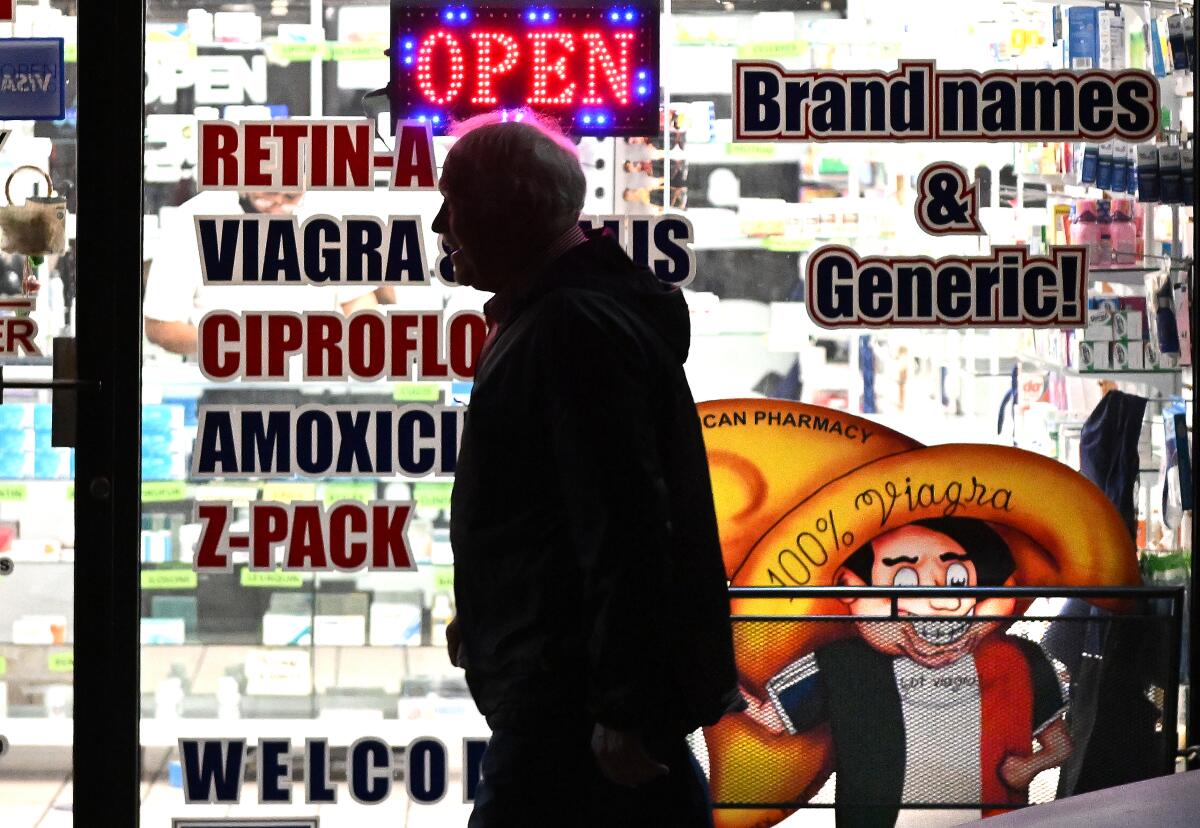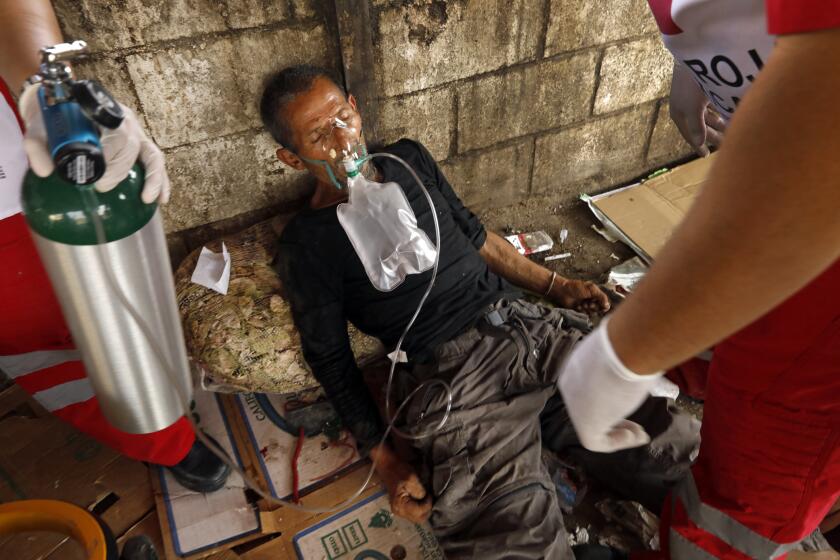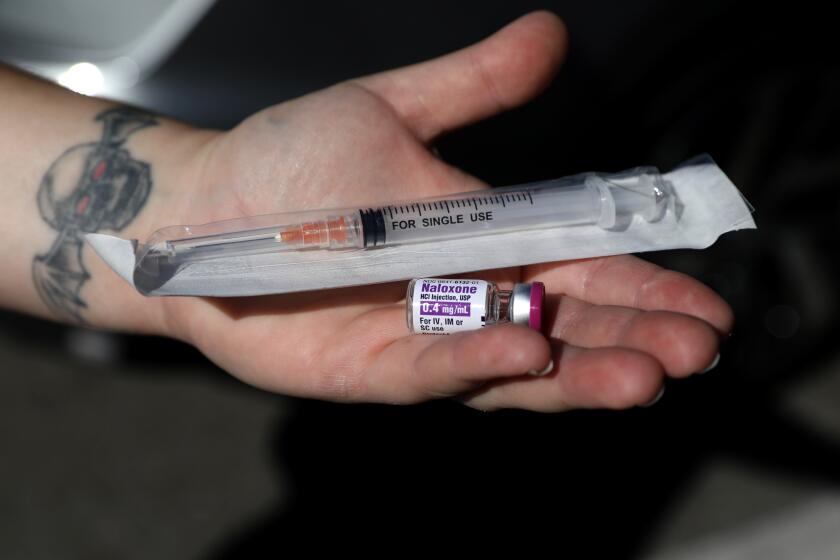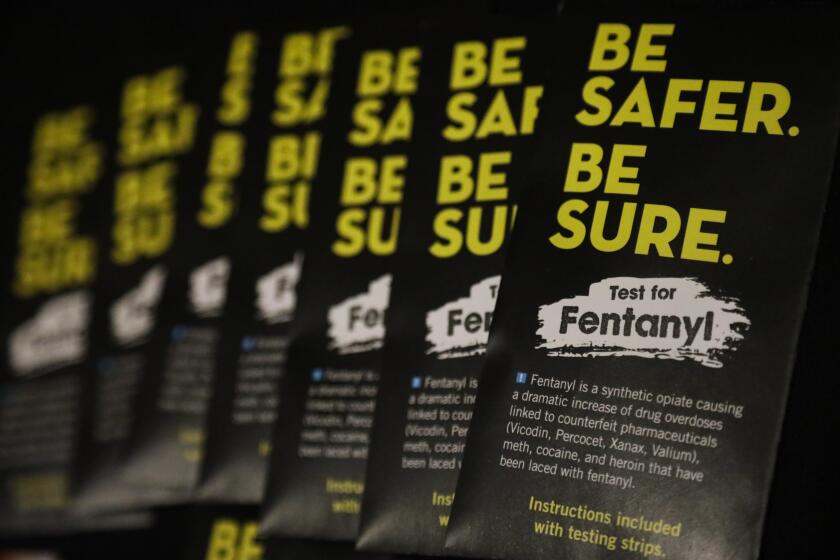Mexican authorities raid pharmacies in inquiry into fentanyl-tainted pills

- Share via
Authorities in Mexico raided several Los Cabos drugstores last month and arrested four people as part of an ongoing investigation into pharmacies selling counterfeit pills laced with fentanyl and methamphetamine.
The flurry of law enforcement action in the peninsular municipality comes on the heels of a Los Angeles Times investigation that found pharmacies from Tulum to Tijuana were passing off powerful drugs, including fentanyl and methamphetamine, as weaker medications commonly sought out by tourists. Of the 55 opioid painkillers and ADHD medications The Times tested over a four-month period, slightly more than half proved to be counterfeit.
Alejandro Torres Pineda, a delegate of the attorney general’s office in Baja California Sur, said Mexico’s investigation was sparked by local media coverage of the issue — coverage that was based on and extensively credited The Times’ reporting.
In total, authorities confiscated nearly 25,000 pills in the raids. None of them tested positive for fentanyl or methamphetamine, according to Pineda, but came back as other controlled substances that the pharmacies did not have authorization to sell.
“We’re continuing the investigations,” he said in a phone interview last week.
The raids are important, Pineda said, “because the sale of controlled medicines is inhibited, the health of citizens is protected and the type of medicines sold in pharmacies is controlled.”
Data compiled by a medical examiner in northern Mexico reveal that fentanyl use is far more common there than the country’s leaders have claimed.
Ahead of the raids, federal police went to different pharmacies around Los Cabos and interviewed people — including one from North America — as they left the businesses. One person told police that she was buying medicine for back pain. When authorities tested the pills, they found that her purchase also ran afoul of regulations.
A judge then granted law enforcement authorities permission to search the pharmacies in Cabo San Lucas and San José del Cabo. Two were raided June 3 and three others were raided June 20. Authorities found diazepam and clonazepam, anti-anxiety medications usually known in the U.S. by the brand names Valium and Klonopin.
The raids by law enforcement — including federal police, the attorney general’s office and the Mexican navy — netted a cache of money and boxes of pills. Images released by Mexico’s attorney general showed clusters of gun-toting, camouflage-clad police wearing balaclavas standing in front of blurred-out drugstores.
Of the people arrested, Pineda said, three were pharmacy employees and the fourth was an owner of one of the businesses. There’s nothing yet that points to cartel involvement, he added.
The municipal director of public safety in Los Cabos, Jesús Antonio Gómez Rodríguez, framed the recent operation as a positive step.
“In terms of security, the work coordinated by three levels of government is yielding good results, with the aim of guaranteeing the safety of locals and visitors,” Gómez said. “It’s protecting the health of our young people who can fall into the clutches of drugs, as well as the numerous groups of visitors who come to our municipality to enjoy its natural beauties and tourist services.”
Drugstores in Mexico have long been known for selling a wide range of medications over the counter, including many that would require a prescription in the U.S. Until recently, drug market experts had generally believed that pills sold in stores — unlike those sold on the street — were at least what the store owners said they were.
The state and L.A. County have worked hard to make Naloxone more widely available. One of the hurdles, though, has been the price of the inhalable version, Narcan.
But in February, The Times published an investigation after testing pills from pharmacies in three cities, including San José del Cabo and Cabo San Lucas. In each city, some of the pills sold over the counter as either oxycodone or Adderall tested positive for fentanyl or methamphetamine. Around the same time, a UCLA research team recorded similar findings.
Over the next few weeks, reporters identified at least half a dozen people who overdosed or died after taking pills they’d purchased at pharmacies in Mexico. Grieving families had been alerting U.S. government officials as early as 2018. It was not until March, however, that the U.S. State Department explicitly warned the public about the danger.
On June 14, The Times published a broader investigation, documenting the problem across the country, from Mexico’s southeastern tip in the Yucatán Peninsula to its border with California. Of the 55 pills reporters tested, 28 were counterfeit.
According to El Sudcaliforniano, a regional news site in Mexico, last year Baja California Sur health officials inspected 628 pharmacies, including 175 in Los Cabos. During those visits, inspectors checked licenses and documentation and found everything to be in order. But they later told the outlet it was not up to state officials to do the laboratory testing to confirm the chemical makeup of the drugs.
Health officials also told the news site in February that they found no records of people dying due to adulterated medicine — though there has been a lack of the kind of postmortem toxicology testing in Mexico that would be needed to make that determination.
After similar inspections in the spring, the Cabo Sun reported that state health officials visited more than 100 pharmacies in Baja California Sur. In Los Cabos alone, the news site said, officials shut down nine pharmacies for distributing controlled substances.
When The Times first contacted the attorney general’s office in February, a federal prosecutor there — who has since asked to not be named due to safety concerns — said it was the first time she’d heard of fentanyl-tainted pills appearing in pharmacies. She called it “a new modus operandi that we haven’t detected before” and said that officials were “concerned.”
To better understand the problem, she said, authorities would “need to find where in the process they’re faking the pills” and determine “if pharmacies are involved in criminal activity or they don’t know if they are selling medications with fentanyl.”
In June, the prosecutor told reporters in an email that federal health officials were interested in The Times’ investigation and hoped to file a complaint with her office for potential prosecution. The Times did not provide Mexican authorities with information about the pharmacies reporters visited.
After prosecutors and police opened an investigation, a judge granted them permission to search several pharmacies.
But for Mary Harrell — whose son overdosed and died after he bought a fentanyl-tainted pill at a pharmacy in Cabo San Lucas in 2019 — the enforcement actions came as little consolation. The Camarillo woman said she wished authorities in Mexico had taken action sooner.
“It’s not going to stop,” she said. “If it were a real cleanup you’d have the president going after it — but you don’t.”
Fentanyl is often mixed with other drugs (including heroin, methamphetamine and cocaine) to increase potency, but it can be deadly. Test kits can help.
More to Read
Sign up for Essential California
The most important California stories and recommendations in your inbox every morning.
You may occasionally receive promotional content from the Los Angeles Times.
















